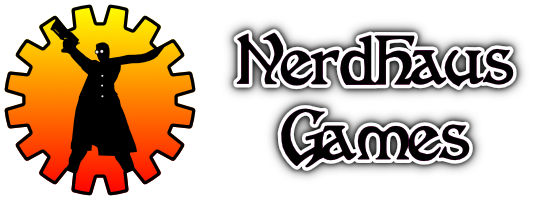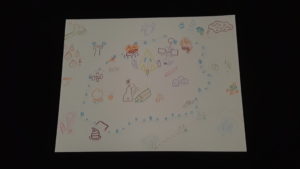This game was a first for me, a GM-less experience without specific PCs that functions as a world building exercise as well as an rpg experience.
The Quiet Year by Avery Alder follows a community after things have collapsed, in a lull between their conflict with a group known as The Jackals and before the arrival of the mysterious Frost Shepherds which ends the game on a random card during the winter. The game is available for download and can be run as a print-and-play or by buying the printed copy which has you looking fewer things up. Either way, you’ll need some paper and writing implements to plan your community. Hopefully, your community fares better than ours did…
The game begins by making some decisions about where and when your game takes place. We decided on a science fiction angle, with a failed terraforming experiment defining our colony of survivors. Next, you set a group of resources that will be critical to your session, and then select one of them to be a surplus and the rest as shortages. Our community had access to a lot of raw metal, and coming up short on livestock, maintenance, radiation, and homesickness. Those last two were interpreted as our planet suffering under a dim star that threatened our crops and solar power generation, and the latter as our group wishing to distance themselves from the Earth-based concerns that led us to this planet 40 to 50 years ago.
Each turn consists of a player drawing a card to determine events that concern the colony for the week, and a decision to be made. Once they pick which half of the card to respond to, they can explore more of the map, announce work on a project the settlement will begin on, or hold a discussion on a subject of importance to the community and get each player’s brief response. Each element that changes the community (playing cards, discovering something, finishing a project) gets recorded on the map by the players. By the end of the game, it looks something like this:
Our sci-fi colony got rocky pretty quickly, due I think to two factors: some of our players had already been playing a lot of player-authored games so we were ready to set things on fire and ruin our lives for the sake of drama, and because there is a contempt “mechanic” in the game. I put it in quotes because the tokens are really just there for players to indicate the populace’s feelings on controversial decisions, but our facilitator said she’s never seen a group use them as much as we did. They have no rules impact, you just grab one to show that some part of the population doesn’t love what you did, or toss one back when you feel like community leadership has corrected course. Some games never use them. On average, each of us had about three.
The main split in the community was between the Town Elders, who were the original astronauts who came from Earth to establish the colony and installed the cloning tubes and started the livestock and crops. The New Breed were genetically modified to better adapt to the planet, and felt little kinship with the original Earth. This is their homeworld. Some clone lineages felt like preserving the connection, and others were opposed and pushed to embrace this new world. This fundamental disagreement resulted in strict factionalism that eventually bubbled over into clandestine murders, deserters from the colony, and establishing a new religion. The rift in the community meant different players were pushing different agendas and whenever the pendulum swung the other way it was sure to get some contempt tokens on the table.
I don’t think the players disagreed as much as our colonists did. We had little stake personally in the survival of this colony, but it was interesting to watch the New Breed and old-timers come into conflict every week or two. There was a hardcore representative for each faction who could be relied upon to summon up some fire in defending their choices, and the other three players were more moderate and shifted their focus as needed. It made for a dynamic game with some memorable NPCs: the space Amish “Parrish” who came to live among us from a rival colony and who became the focus of political violence, the firebrand Daniel who destroyed the cloning tubes to force us to live on our own here, the subversive Dierla who fled in the spring with minimal support and returned with a chunk of the rival colony’s civil war refugees three seasons later.
The differences between us meant we didn’t focus as much as we could on preparing for winter and the coming of the Frost Shepherds. We had made weapons from the native crystals and prepared a bunker for food and quietly expanded it to hold a percentage of the population. It wouldn’t be enough. The game takes a “choose your own adventure” approach to ending the game with each player narrating their take on the arrival of the (previously undefined) Frost Shepherds. We differed on the specifics, but none of us felt that this colony deserved to survive.
My takeaway is that it was a great experience to build the beginning of something. As a game, it’s a great storytelling experience but I missed the singular viewpoint of a character in Fiasco or Protocol (similarly rules sparse and zero prep, but character based). I would absolutely use it during a Session Zero to explore the issues facing a community and seed some NPCs and plot lines. There’s also a fantasy version available called The Deep Forest that wrestles with some different issues than post-apocalypse and scarcity, but follows a similar “year in the life” approach for monsters throwing off the yoke of human occupation and fearing the return of a band of adventurers that may end all non-humans in the woods.
Final verdict? As a game it’s a fun way to spend a few hours wrestling with issues as a group. As a prep tool for further storytelling, it would result in a deeper experience with the community you spring from and ultimately defend or abandon in an RPG. I recommend taking a look at it.
Next time, we’ll take a peek at the tensions and struggles of animals, domesticated and wild, in the suburbs right under our noses in Untamed Suburbia, a system I’m developing that survived its first contact with players!

